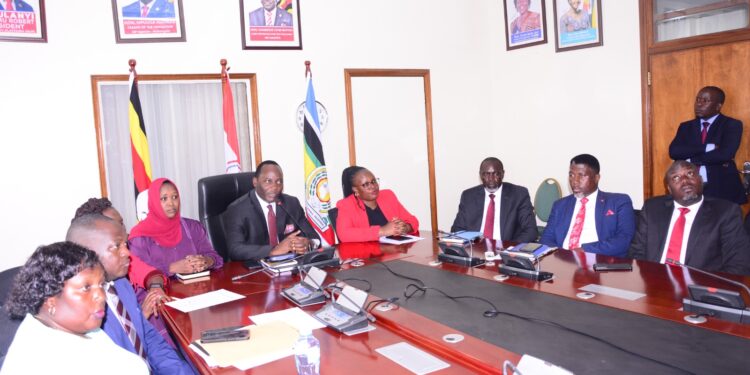In a bold display of defiance, the political landscape in Uganda is witnessing audacious moves as the Leader of Opposition in Parliament,Mathias Mpuuga, rallies fellow opposition Members of Parliament (MPs) to attend crucial committee meetings despite explicit directives from Speaker Anita Among.
Mpuuga’s resolute call for action amid contentious directives has added a layer of intensity to the ongoing power dynamics within Uganda’s parliamentary sphere.
The Leader of the Opposition’s impassioned plea for opposition MPs to uphold their commitment to legislative duties signifies a larger ideological standoff between the opposition and the Speaker’s office. In an era marked by political polarization, Mpuuga’s gameplay symbolizes strategic defiance, challenging the perceived overreach of authority while underscoring the opposition’s unwavering dedication to their roles as lawmakers.
During the preceeding week’s Parliamentary plenary session, the Speaker issued stern warnings directed towards Members of Parliament who had been consistently absent from these crucial sessions. Among the directives outlined was a stark ultimatum: MPs failing to attend plenary sessions risked exclusion from the list of attendees slated for the upcoming Parliamentary East African games. Additionally, the Speaker explicitly instructed Committee Chairpersons to deny participation in committee meetings to any MP who had been absent from the plenary sessions.
Notably, these directives were specifically targeted at opposition lawmakers, who had undertaken a deliberate boycott of plenary sessions for over a month. This orchestrated absence was a strategic move by the opposition to exert pressure on the executive branch, demanding transparency regarding the whereabouts of 18 individuals allegedly abducted by state forces.
The Speaker’s instructions, seen as a direct response to the opposition’s boycott, escalated tensions within Parliament, crystallizing the growing power struggle between opposing political factions.
However, on Tuesday while addressing journalists, Mpuuga said that his shadow cabinet had agreed to carry on with the plenary boycott. In their meeting, the shadow cabinet restated their earlier stand that opposition lawmakers continue performing their oversight roles and participate in the various parliamentary activities since there’s no one under the law that can stop a Member of Parliament from exercising their mandate.
“Our Members should continue to attend Committee meetings and my advisory to the Chairpersons of the Committees is that they should desist from appearing to be enforcing what is unenforceable. They need not act in total disregard of the law and common sense. Our MPs defy any chairperson who attempts to chase them from Committee meetings. I want also to inform the country that our boycott standstill holds,” he said.
He also stressed that whatever they are doing as the opposition legislators is what was agreed and there is no member of the opposition knows it clearly.
The decision to push opposition lawmakers forward and participate in these committee meetings, despite the Speaker’s orders, sheds Mpuuga as a believer in the fundamental principles of representation and governance. It also serves as a symbolic assertion of the opposition’s refusal to acquiesce to directives perceived as compromising their legislative responsibilities.
As tensions escalate and the political discourse intensifies, this act of defiance reshapes the contours of power struggles within Uganda’s parliamentary framework. Mpuuga’s call for action sets the stage for a potential clash between institutional authority and individual conviction, sparking debates on the limits of parliamentary mandates and the imperative of upholding democratic values.
Do you have a story in your community or an opinion to share with us: Email us at editorial@watchdoguganda.com













